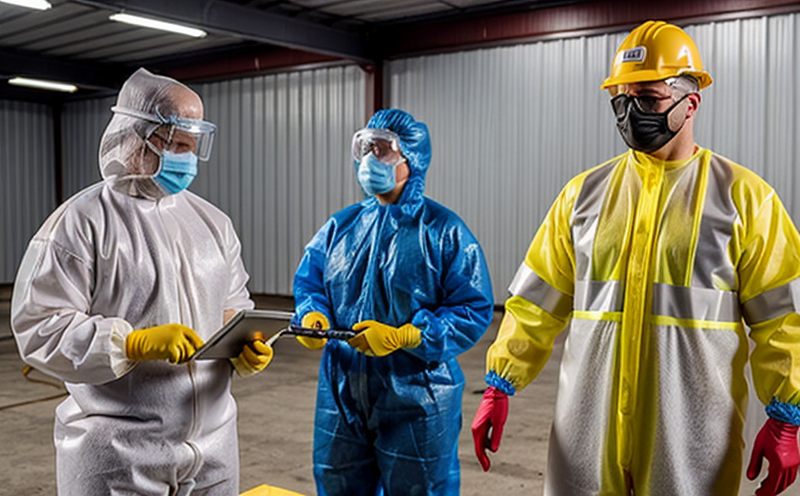ANSI Z87.1 Safety Eyewear Optical and Impact Testing
The ANSI Z87.1 standard is a critical benchmark for manufacturers of safety eyewear, ensuring that the products they produce meet stringent requirements to protect workers against various hazards encountered in occupational settings.
An important aspect of this standard is the optical performance testing which ensures that the lenses and frames of protective eyewear provide clear vision under specified conditions. This includes tests such as light transmission, distortion, and chromaticity, all designed to guarantee that the user can see clearly when wearing the safety eyewear in their work environment.
Another key component is impact resistance testing, which evaluates the ability of the eyewear to withstand impacts from various sources like flying particles or objects. This testing typically involves simulating real-world scenarios where workers might be exposed to such hazards, ensuring that the eyewear can provide adequate protection against these potential threats.
The standard also includes tests for side impact resistance and penetration resistance, which are crucial in verifying that the eyewear can protect users from specific types of impacts. These tests help ensure that the safety eyewear meets the rigorous requirements set forth by ANSI Z87.1, thereby enhancing workplace safety and compliance with industry standards.
Our laboratory uses cutting-edge equipment and methodologies to conduct these tests accurately and efficiently. Our team of experts ensures that each test is performed according to the latest revisions of ANSI Z87.1, guaranteeing reliable results. Whether you are a manufacturer looking to ensure your products meet the highest safety standards or an organization seeking to verify the effectiveness of your current protective equipment, our services provide peace of mind and regulatory compliance.
Understanding these tests is crucial for those involved in occupational safety, especially as they directly impact worker health and productivity. By adhering to ANSI Z87.1 guidelines, organizations can significantly reduce the risk of workplace injuries related to eye hazards, thereby contributing to a safer working environment.
- Light Transmission: Ensures that the eyewear allows for adequate light transmission without compromising on impact resistance.
- Distortion and Chromaticity Tests: Verify that the lenses do not distort or alter colors in a way that would impair vision during use.
- Impact Resistance Testing: Simulates real-world impacts to ensure the eyewear can withstand the kind of forces it might encounter on the job site.
- Side Impact and Penetration Tests: Additional tests designed to provide extra protection against specific types of hazards.
Our comprehensive approach ensures that every aspect of ANSI Z87.1 is thoroughly addressed, providing accurate and reliable testing results for all safety eyewear products.
Benefits
Complying with the ANSI Z87.1 standard through our rigorous testing services offers numerous benefits to manufacturers and organizations alike:
- Enhanced Safety: Ensures that safety eyewear meets strict standards, significantly reducing the risk of eye injuries in occupational settings.
- Regulatory Compliance: Provides clear evidence that your products meet or exceed industry and regulatory requirements.
- Increased Market Trust: Builds confidence among clients and customers, enhancing your brand's reputation as a leader in safety equipment.
- Improved Product Quality: Identifies potential weaknesses early on, allowing for necessary improvements before products reach the market.
- Competitive Advantage: Differentiates your products from competitors by demonstrating superior adherence to safety standards.
By leveraging our expertise in ANSI Z87.1 testing, you can ensure that your products are not only safe but also meet or exceed the expectations of regulatory bodies and end-users alike.
International Acceptance and Recognition
The ANSI Z87.1 standard is widely recognized and accepted across various countries, ensuring a level of consistency in safety standards that can be trusted globally:
- Australia: The Australian Standard AS/NZS 1336.4:2015 for Occupational Protective Eye Wear adopts the ANSI Z87.1 standard.
- New Zealand: New Zealand's safety regulations for occupational protective equipment are closely aligned with ANSI Z87.1, ensuring compatibility and interchangeability of products.
- European Union: While not directly adopting ANSI Z87.1 as a standalone standard, the EU harmonizes its standards to align with international best practices, including those from ANSI Z87.1.
- Canada: The Canadian Standards Association (CSA) Z94.3-2015 for Occupational Eye Protection explicitly references and aligns with ANSI Z87.1.
- United Kingdom: The British Standard BS EN ISO 13630:2006, which covers occupational protective equipment, is based on the principles of ANSI Z87.1.
This widespread acceptance ensures that products tested to ANSI Z87.1 standards are readily accepted in markets around the world, providing a seamless experience for manufacturers and distributors operating internationally.
Competitive Advantage and Market Impact
The ability to demonstrate compliance with ANSI Z87.1 is a significant asset for any organization in the occupational safety sector. Here’s how it can drive competitive advantage:
- Meeting Customer Expectations: Many organizations prioritize purchasing products that meet or exceed industry standards, making ANSI Z87.1 compliance a key differentiator.
- Enhanced Brand Reputation: By adhering to stringent safety standards, you can build trust and credibility with customers, enhancing your brand’s reputation.
- Avoidance of Regulatory Penalties: Non-compliance can lead to legal issues and financial penalties. Meeting ANSI Z87.1 ensures that you avoid these risks.
- Potential for Market Expansion: Global markets often require products to meet specific safety standards, making compliance with ANSI Z87.1 a prerequisite for entry into international markets.
- Innovation and Improvement: The testing process provides valuable insights that can drive continuous improvement in product design and manufacturing processes.
By incorporating ANSI Z87.1-compliant safety eyewear into your offerings, you position yourself as a leader in occupational safety, setting a new benchmark for excellence in the industry.





